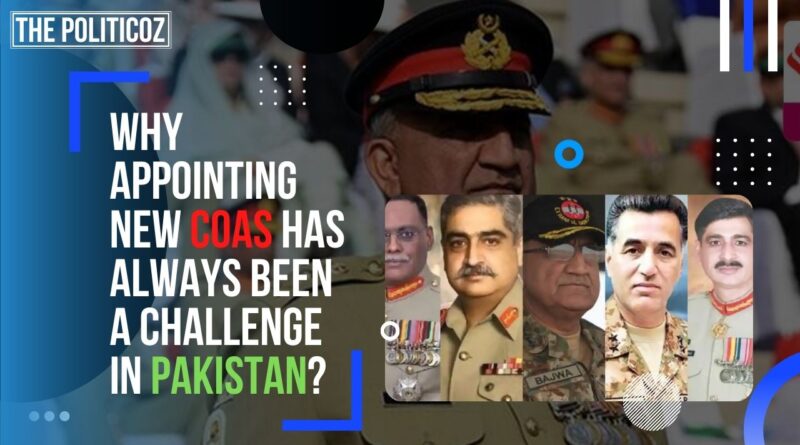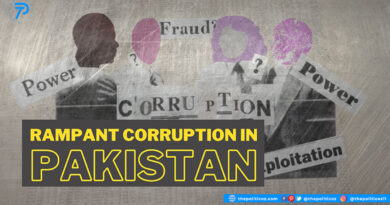Why appointing New Chief of Army Staff (COAS) has always been challenging in Pakistan?
Why appointing New COAS has always been challenging in Pakistan?
The Chief of Army Staff, and the top military official in Pakistan, is COAS. The designation of COAS is the most powerful position in Pakistan. In 1972, the title Commander-in-Chief of the Pakistan Army was replaced with the title Chief of the Army Staff. Ten four-star army generals have been appointed by statute as head of army staff since 1972.
How COAS is selected?
The President confirms the Prime Minister’s choice and nomination of the Chief of Army Staff after the Prime Minister has authorised its nomination and appointment. General Qamar Javed Bajwa has been the Chief of Army Staff since November 29, 2016, and his office is located in the Army General Headquarters.
The Chief of Army Staff exercises its responsibility of command and control of the operations belligerent management. Unlike the U.S. Army Chief of Staff, training commands are under the Army. Due to its stature, the Chief of Army Staff has been instrumental in enforcing martial laws against the civilian government due to the meltdown of civil-military relations in the past decades.
It is in our knowledge that since Pakistan’s creation nearly 70 years ago, the military has been in charge of the nation. It is not anticipated that the simple change in the Chief of the Army will affect the entrenched anti-Indian position and rigid enmity.
The issue, though, is that most of the other requirements were also difficult to meet. Immediately to mind are seniority and suitability. Despite their command of military matters, not every three-star general, admiral, or air marshal will perform as well as others when given the responsibilities of a service chief.
But assessing a four-star candidate’s potential in these areas is risky; it’s usually beyond the competence of a typical prime minister or the group of advisors that person is usually saddled with. In order to make the task even more difficult and to humble the powerful, it occasionally happens that someone who initially appears to be lacking in this regard performs admirably while serving in office. Although everyone was aware of Zia’s eccentricities, no one ever imagined that he would be able to rule the globe when he was in a position of authority. Whatever your feelings may be, it was the current situation.
Unfortunately, there is a tendency among our civilian leaders to look for someone who they believe would be loyal to them. Often, they would prefer a dark horse over one perceived as more eligible. There are many such examples in our history. But when it comes to the crunch, it’s the institution that acts.
Past to Present Scenario
Pakistan’s present political turmoil is fueled by the debate over who would name the new army chief in November. It was thought to be one of the causes of the overthrow of Imran Khan’s administration. It was rumoured that the former prime minister intended to choose a “favourite” for the important position and install autocratic control with the support of the military.
When we look back, Raheel Sharif was appointed as the nation’s 15th Chief of Army Staff on November 29, 2013, by Prime Minister Nawaz Sharif. Raheel Sharif was a “breath of fresh air” for the Pakistani people because he was neither the country’s President nor prime minister. In fact, for the first time in the history of the Pakistani Army, a general retired on time after serving his entire three-year term. He became incredibly well-liked due to his Zarb-e-Azb operation against Tehreek-e-Taliban terrorists in North Waziristan and the cleansing operations in Karachi, which markedly reduced crime and terrorist activity in these regions. And General Bajwa‘s name was recommended by the outgoing Army Chief, General Raheel Sharif.
The tenure of Bajwa started on November 29 2016 and was to end on November 29 2019, but PM Imran Khan gave him an extension for five years. So finally, the term ends on November 29 2022. An Army brigade is willing to opt new army chief this time.
Options are as follows.
One of the four candidates, Lt. Gen. Sahir Shamshad Mirza, is unquestionably the front-runner for either of the two roles of Chairman of the Joint Chiefs of Staff Committee (CJCSC) and Chief of Army Staff (COAS)
Lt. Gen. Azhar Abbas is the top brass member with the most knowledge of Indian relations. Currently, he oversees the Army and the intelligence and operations directorates as the Chief of General Staff (CGS).
Lt Gen Faiz Hamid, a soldier in the Baloch Regiment, is another of the most well-known contenders for the position of commander in chief. He was at the centre of an argument between the COAS and the previous prime minister Imran Khan.
Another contender, Lt. Gen. Mohammed Amir, is a soldier in the Artillery Regiment and currently serves as the commander of the XXX corps in Gujranwala. He has held the position of director-general of Staff Duties in the COAS secretariat and has vast expertise in both GHQ and command roles.
To cap it all, politically motivated decisions will be detrimental to the institution and the democratic process. It is significantly more crucial for political parties to concentrate on advancing democracy rather than picking a favourite general and enlisting the military’s support. It is a history lesson that has to be remembered.
The result of this back-and-forth is that sticking with tenure and seniority is the best choice in the current environment. This is because it avoids the unhealthy public discourse that usually precedes such selections, the complexity of the alternatives and, most importantly, the lobbying efforts of an unusual candidate. Who among the top two would serve as a better advisor to the government on defence issues may be the only decision to be taken. He would be the perfect choice to lead the Joint Chiefs of Staff Committee and relieve the COAS of this taxing responsibility.
Syed Nek Muhammad| Former student of BS Political Science




